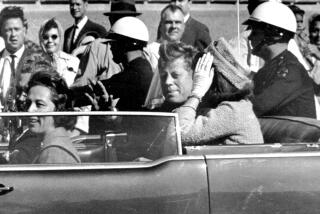Richard S. Ross dies at 91; doctor examined President Nixon amid Watergate inquiry
Dr. Richard S. Ross, a Johns Hopkins University cardiologist who helped examine former President Nixon to determine his ability to testify during the Watergate investigation, has died at his home in Baltimore. He was 91.
His Aug. 11 death from complications of Parkinson’s disease was announced by the Johns Hopkins University School of Medicine.
Ross served as medical school dean from 1975 to 1990, a period of accelerated growth at Johns Hopkins. Under his watch the school doubled its research space, became a consistent recipient of federal research grants and rose as a model of diversity.
As a cardiologist, Ross developed methods for measuring blood flow and introduced an X-ray movie technique — known as coronary cineangiography — to help treat coronary artery and vascular heart disease.
But his national moment arrived in 1974 when he became one of three physicians asked by Chief Judge John Sirica of the U.S. District Court in Washington to examine the former president at his home in San Clemente — the so-called Western White House.
Nixon had recently become the first American president to resign and sentiments ranged widely on whether complications from phlebitis — an inflammation of the veins in the legs — stood in the way of Nixon returning to Washington to testify at the Watergate cover-up hearings for his former aides.
In his memoir “In the Arena,” Nixon recalled that two of the physicians seemed to take delight in being handed the task of examining the former president, while the third seemed sheepish at best. He didn’t say which camp Ross fell into.
The trio of doctors concluded that the former president was too ill to travel, and Sirica said the hearings were too important to wait for Nixon’s health to improve.
Ross was born Jan 18, 1924, in Richmond, Ind., where his father was superintendent of the Eastern Indiana Hospital for the Insane. He graduated from Harvard Medical School without finishing his undergraduate degree, a wrinkle created by the accelerated academic programs designed to speed along future doctors during World War II.
He did a yearlong residency at Johns Hopkins before joining the Army Medical Corps during the Korean War and returned two years later as a chief medical resident. He remained at Johns Hopkins the rest of his career.
He is survived by his wife, Elizabeth “Boo” McCracken; a son, two daughters, and five grandchildren.
More to Read
Start your day right
Sign up for Essential California for the L.A. Times biggest news, features and recommendations in your inbox six days a week.
You may occasionally receive promotional content from the Los Angeles Times.






